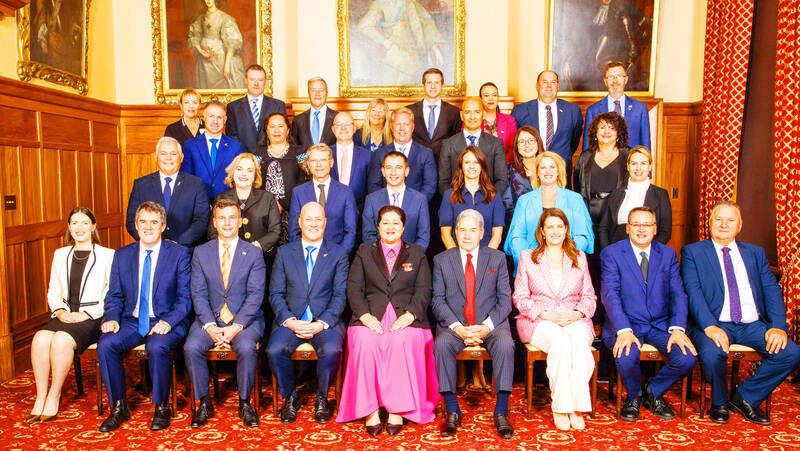New Zealand’s plans for world-leading anti-smoking laws are to be revoked, Christopher Luxon confirmed yesterday after being sworn in as prime minister, in a move described as a “huge win for the tobacco industry.”
Former airline boss Luxon took over six weeks after his conservative National Party won national elections, ending a six-year Labour Party reign ushered in by former prime minister Jacinda Ardern.
Luxon, 53, was sworn in as head of a new coalition government by New Zealand Governor-General Cindy Kiro in a ceremony in the capital, Wellington.

Photo: AP / New Zealand Herald
“It is an honor and an awesome responsibility,” Luxon told reporters.
The conservative said he would prioritize taming inflation and bringing down interest rates, and also confirmed he would scrap a so-called “generational smoking ban” adopted last year that stops sales of tobacco to anyone born after 2008.
Luxon said the tax revenue from ongoing cigarette sales would generate welcome income for the government, but also voiced concern that the ban would create a flourishing — and untaxed — black market.
The move was criticized by anti-smoking groups as a step back for the country.
“This is a major loss for public health, and a huge win for the tobacco industry, whose profits will be boosted at the expense of Kiwi lives,” the Health Coalition Aotearoa — the Maori name for New Zealand — said in a statement.
The anti-smoking legislation, scheduled to start later this year, was designed to almost immediately reduce the number of people using tobacco products. While the number of adults smoking in New Zealand is relatively low at just 8 percent, the previous government had envisioned a future where the country was completely smoke-free.
As well as the steadily increasing age limit, the new law would have slashed the number of retailers able to sell tobacco products to a maximum of just 600 nationwide, a massive drop from the current 6,000.
Originally unveiled by then-prime minister Ardern and praised by public health experts and anti-smoking advocates, a suite of near-identical measures were recently announced in the UK.

Seven people sustained mostly minor injuries in an airplane fire in South Korea, authorities said yesterday, with local media suggesting the blaze might have been caused by a portable battery stored in the overhead bin. The Air Busan plane, an Airbus A321, was set to fly to Hong Kong from Gimhae International Airport in southeastern Busan, but caught fire in the rear section on Tuesday night, the South Korean Ministry of Land, Infrastructure and Transport said. A total of 169 passengers and seven flight attendants and staff were evacuated down inflatable slides, it said. Authorities initially reported three injuries, but revised the number

‘BALD-FACED LIE’: The woman is accused of administering non-prescribed drugs to the one-year-old and filmed the toddler’s distress to solicit donations online A social media influencer accused of filming the torture of her baby to gain money allegedly manufactured symptoms causing the toddler to have brain surgery, a magistrate has heard. The 34-year-old Queensland woman is charged with torturing an infant and posting videos of the little girl online to build a social media following and solicit donations. A decision on her bail application in a Brisbane court was yesterday postponed after the magistrate opted to take more time before making a decision in an effort “not to be overwhelmed” by the nature of allegations “so offensive to right-thinking people.” The Sunshine Coast woman —

BORDER SERVICES: With the US-funded International Rescue Committee telling clinics to shut by tomorrow, Burmese refugees face sudden discharge from Thai hospitals Healthcare centers serving tens of thousands of refugees on the Thai-Myanmar border have been ordered shut after US President Donald Trump froze most foreign aid last week, forcing Thai officials to transport the sickest patients to other facilities. The International Rescue Committee (IRC), which funds the clinics with US support, told the facilities to shut by tomorrow, a local official and two camp committee members said. The IRC did not respond to a request for comment. Trump last week paused development assistance from the US Agency for International Development for 90 days to assess compatibility with his “America First” policy. The freeze has thrown
TESTING BAN: Satellite photos show a facility in the Chinese city of Mianyang that could aid nuclear weapons design and power generation, a US researcher said China appears to be building a large laser-ignited fusion research center in the southwestern city of Mianyang, experts at two analytical organizations said, a development that could aid nuclear weapons design and work exploring power generation. Satellite photos show four outlying “arms” that would house laser bays, and a central experiment bay that would hold a target chamber containing hydrogen isotopes the powerful lasers would fuse together, producing energy, said Decker Eveleth, a researcher at US-based independent research organization CNA Corp. It is a similar layout to the US$3.5 billion US National Ignition Facility (NIF) in northern California, which in 2022 generated